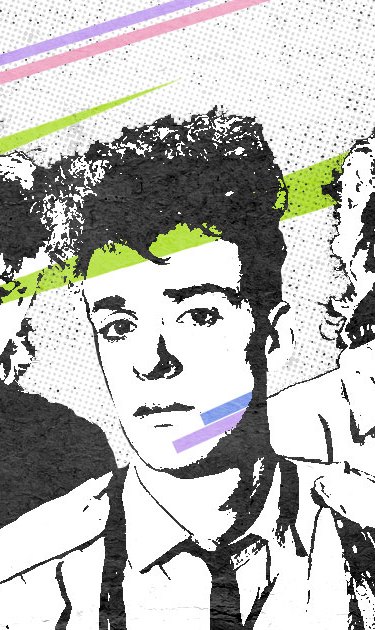It’s hard to imagine Soda Stereo being anything but the titans of rock en español that they are. Being one of the most important bands to ever come out of Latin America, Soda’s sales number in the thousands and concert attendance are another metric that shows their significance and that’s before even considering a veritable phonebook worth of singles that have become standards for generations. It’s hard to imagine them as anything but giants; yet, they once were a little band trying to find a few gigs and time in recording studios. And thanks to Soda Stereo, released 35 years ago today, you can hear the band as they were in their beginnings.
Soda Stereo’s self-titled debut – released August 27, 1984 – represented the first steps of the band into their career; trying out different sounds, venturing into both commercial and uncharted territory, feeling fresh and not always entirely serious. As part of a new wave of punk and power pop-influenced Argentina bands that were sweeping the country and many a festival, they were fast becoming popular, presenting top-notch songwriting on par with big figures like Charly García and Luis Alberto Spinetta. Arguably, it’s here that the seeds of rock en tu idioma were planted.
Soda Stereo was formed in 1982 by the late Gustavo Cerati (vocals/guitar), Zeta Bosio (bass) and Charly Alberti (drums) under the name Los Estereotipos. They soon changed their name in order to stand out from all the other “Los” bands playing around the Argentina circuit. After decades of brilliant rock music by the likes of Almendra, Pescado Rabioso, Vox Dei and Sui Generis, the military coup in 1976 and subsequent dictatorship forced most rock music to go underground. Authorities at the time saw the genre as a threat to their regime. This came to an end in December 1983 when Raúl Alfonsín was elected in the country’s first democratic elections since the coup, ushering a new era of freedom for the population. While rock music never really went away, the changing of the wards had already affected the music community.
In the same year that Soda debuted, many other important records in the scene arrived. Among those, some of the most noteworthy were Del 63 by Fito Paez and Los Enanitos Verdes’ self-titled album, as well as the last Spinetta Jade album before Luis Alberto went fully solo and Charly García released his classic Piano Bar. 1984 also saw influential band Virus put out Relax, their third album, Sumo continued playing festivals and released a demo out, and Los Violadores had already released their debut album a year before, planting the seeds of punk in Argentina. Other notable records were Himno de Mi Corazón by Los Abuelos de la Nada as well as the solo debut of Abuelos member Andrés Calamaro, titled Hotel Calamaro. Festivals were starting all over the country and the future seemed bright.

In many ways, Soda Stereo reflects that era, and at other times, it points to the future. Tracks like opener “¿Por Qué No Puedo Ser Del Jet Set?” and “El Tiempo Es Dinero” talk about materialism and class struggles at the time in the country, no doubt a product of the dictatorship; on the other hand, on “Dietético,” Cerati sings “el régimen se acabó” over and over. There’s plenty of humor as well, and much eclecticism in their sound that would become their signature, but their best moments are when they combine social criticism with a wink –both lyrical and musically – like in “Sobredosis de T.V.” and “Te Hacen Falta Vitaminas.”
It’s still a little surprising listening to the ska influences on “Jet Set,” a result of listening to The Specials and other Two-Tone Records artists. In the album – produced by Virus frontman Federico Moura – you can also hear shades of Devo and Oingo Boingo in their material, making it a light and breezy listen. Having said that, there’s plenty of brilliance around the record, building the roads that would take them to the stratosphere. Songs like “Tele-K” and especially “Trátame Suavemente” – the latter written by lifelong Soda and Cerati collaborator Daniel Melero – show that they could do wonders with melodies, arrangements that would defy expectations and virtuosity in service of the song. You can hear them play around with song structures just enough to keep things interesting. There are some fairly dated songs here, but for the most part, it’s a delightful listen that still satisfy.
Listening now to Soda Stereo reveals the genesis not only of the band as standard-bearers of their time and place but also of what was about to happen elsewhere in Latin America.

The record didn’t represent an instant success but rather a steady rise to the top tier of the Argentina rock scene. Five of the 11 tracks of the record were released as singles and got great airplay; on the live front, Soda would be placed higher on festival bills and their headlining shows were hosted on increasingly larger venues. They toured their own country without much intention to go outside their borders; there was hardly a need, the country was brimming with energy and music.
Listening now to Soda Stereo reveals the genesis not only of the band as standard-bearers of their time and place but also of what was about to happen elsewhere in Latin America. Their next album, Nada Personal, would yield some of their first international hits like “Cuando Pase El Temblor” and “Juegos de Seducción.” By the late-’80s, bands like Caifanes and Maná would break out of the Mexican scene with a new wave-indebted sound that bore more than a passing similarity to Soda’s early tracks, while like-minded Spanish acts like Hombres G, Alaska & Dinarama and Radio Futura ventured to the continent to find great success. Post-punk and new wave from the UK resounded with the rock en español crowd but it wouldn’t have gone far without Soda Stereo leading the way.
Every history has a beginning and the rock en español explosion of the 1980s has one in Soda Stereo, that it remains both brilliant and fun as hell is a testament to their talent.




